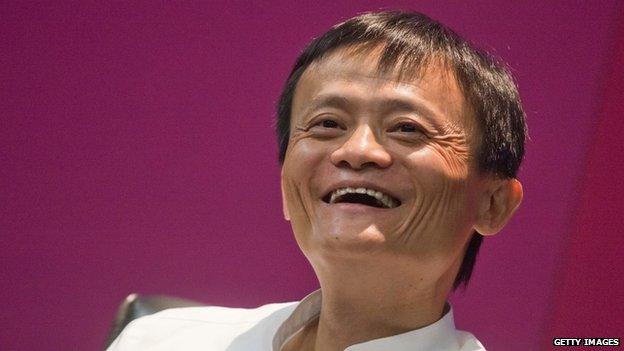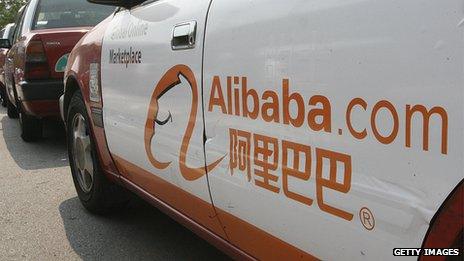Alibaba prepares record breaking share sale
- Published

Alibaba founder Jack Ma is about to become a much richer man following its initial public offering
Next week, Alibaba is expected to sell shares for the first time in an initial public offering (IPO) in New York.
It could raise $20 billion (£12bn) which would make it bigger than Facebook's IPO, which raised $16 billion in 2012 and was the previous biggest share sale for an internet company.
That deal gave Facebook a market value of over $100 billion.
By comparison, analysts are valuing Alibaba at over $100 billion and even up to $200 billion.
In terms of internet companies, that is only smaller in size than Google (worth about $400 billion) and Facebook (now valued at over $200 billion).
In fact, Alibaba's share sale would be close in size to the biggest IPO in history which was the record $22.1 billion raised by the Chinese state-owned commercial bank, Agricultural Bank of China, in 2010.
So are investors just buying into China's massive e-commerce market?
With only about half of the 1.3 billion people in the world's most populous nation online, there is huge potential.
Compare that to the US, with over 300 million people, but nearly 90% internet penetration.
Importantly, Alibaba accounts for over three-quarters of all online retail sales in China, so its growth can plausibly track the overall market which I have written about before.
That's why it has had impressive annual revenue growth of 40-50% according to its own filings.
By the way, Alibaba's growth is impressive even though double digit sales growth is not uncommon for Chinese companies. The country regularly posts retail sales growth figures of over 10% per year.
The bigger question is whether it can defend its market share with emerging competitors.
How profitable is Alibaba?
The company has a profit margin of over 40% which has been gradually coming down. In any case, it's also an impressive figure.
One of the reasons is that Alibaba operates with minimal assets since its business is based on taking small commissions from its various websites, including Alibaba.com, Taobao, and T-mall.
But, that may change as competition means that the company needs to invest and innovate. Alibaba has invested billions overseas and is expanding further into Europe and the US. But, there's competition not just abroad but at home.
Chinese conglomerate Wanda has just teamed up with two of Alibaba's rivals, Baidu and Tencent, to form e-Wanda, a web portal that sells goods found on the web in stores including those owned by Wanda.

Alibaba is China's biggest e-commerce company
Alibaba itself has already ventured into this space, investing $700 million into Chinese retailer, Intime Retail Group.
Alibaba has also teamed up with Chinese telecoms giant Huawei to offer a fingerprint reader app that would eliminate the need for cumbersome passwords and could give it an edge over its competitors by offering more convenient online payments.
It's clear that there is competition that could erode Alibaba's margins and more importantly, if it can maintain its dominant market share.
Investors when they decide how much to pay for Alibaba's shares will be weighing up the pros and cons and that will determine what the company will be worth.
One way to compare the values of companies is by using a price-to-earnings ratio, which compares profits to the share price.
Tech companies tend to have high price-to-earnings ratios as investors believe in future profits.
It has led to some worrying outcomes when some companies seem to be sold on potential and not actual earnings.
Chinese companies also tend to have high ratios as there are not many blue chip companies that foreign investors can buy into.
So, those which are listed on bourses in New York, Hong Kong and London receive a great deal of interest as proxies for investors trying to buy into the fast-growing consumer market in China.
Looking at another Chinese giant, Hong Kong-listed Tencent, which is the largest listed web company in Asia, it has a price-to-earnings ratio of 30.
Chinese search engine Baidu, which is listed in New York, has an even higher ratio. Globally, tech companies on average have had a ratio of 23 for the past decade and a half.
Some analysts have put Alibaba's price-to-earnings ratio at 50 based on its profits last year of $3.6 billion, which would support a healthy valuation for the company.
But, others have looked at pre-IPO private trades of shares that value it at less than $200 billion and closer to $150 billion. The latter provides very small amounts of information but can help guide the pricing of the stock at the IPO.
We shall soon find out. In any case, though challenges are on the horizon for Alibaba, a huge Chinese market plus overseas expansion potential, a profitable business model, and optimism about future earnings make for a big IPO and will most likely put this Chinese company in the global record books.
For more on corporate movers and shakers, watch Talking Business with Linda Yueh. Broadcast times are found at: Talking Business with Linda Yueh.